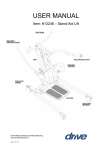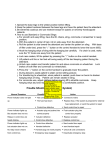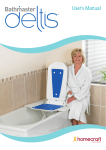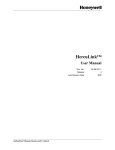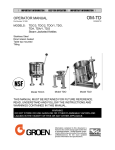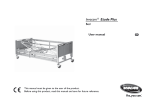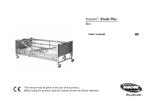Download Drive Medical Design Personal Lift 13240 User's Manual
Transcript
lifetime limited warranty Your Drive brand product is warranted to be free of defects in materials and workmanship for the lifetime of the original consumer purchaser. This device was built to exacting standards and carefully inspected prior to shipment. This Lifetime Limited Warranty is an expression of our confidence in the materials and workmanship of our products and our assurance to the consumer of years of dependable service. In the event of a defect covered by this warranty, we will, at our option, repair or replace the device. This warranty does not cover device failure due to owner misuse or negligence, or normal wear and tear. The warranty does not extend to non-durable components, such as rubber accessories, casters, and grips, which are subject to normal wear and need periodic replacement. If you have a question about your Drive device or this warranty, please contact an authorized Drive dealer. © 2005 Medical Depot, Inc. All rights reserved. Drive is a trademark of Medical Depot, Inc. Port Washington N.Y. 11050 USA Made in China electric patient lift item #13240 instructions The Drive Deluxe Electric Patient Lift is designed to transfer a patient from one resting position to another. It is not a transport device. Use a sling that is recommended by the individual’s physician. During transfer, with patient suspended in a sling to the lift, do not roll caster base over objects such as raised carpet bindings, door frames, or any uneven surfaces that would create an imbalance of the lift. Use steering handles at all times to maneuver the lift. H. Insert the base spreading adjusting handle (#3) into the socket located behind the mast sleeve. I. Attach the cradle (#11) to the end of the boom and make sure the bolts are screwed tightly. J. The lift is now ready to operate. Figure 1 installation Follow Figure 1 (on right) & Figure 2 (on next page) 1 The Electric Patient Lift is packed in one carton which contains the following components: A. Mast with boom B. Base. C. Base spreading adjustment handle. D. Battery box, control box and control handset. E. “C” shaped push bars F. 4/6 point cradle 2 Installation Procedure: (please refer to chart on pg.3) A. Remove the screws (#16, #17) and washer (#20) from the base as indicated. B. With the boom pointed in the same direction as the base legs, insert the mast (#2) into mast sleeve and ensure the mast is in place. C. Install the screw (#16, #17) and washer (#20) on to the mast (#2) through mast sleeve. D. Install the push handles (#14,#15) into the mast (#2) and ensure the screws (#19) on the push handles are screwed tightly. 3 Please refer to the following pictures: E. Unscrew the gold colored screw (#18) F. Mount the control box (#4) on the bracket (#9) and screw back the bolts (#18) on the bottom of the bracket. G. Place and clip the battery pack (#7) on the top of the bracket. Part# Description 1 2 3 4 5 6 7 8 9 10 11 12 13 14 15 Base Assembly Mast Spreading Adjustment Handle Linak Control Box Power Cord Linak Acuator Battery Pack Fitted Screws Mounting Bracket Hand Set 4/6 Point Cradle Boom Fixed Screw “C” Shaped Push Bar - Right “C” Shaped Push Bar - Left Qty 1 1 1 1 1 1 1 2 1 1 1 1 2 1 1 1. Where mast and boom connect, hanging bar hook, pump handle hinge, and caster axles. 2. Where pump and boom attach. 3. Lubricate above mentioned every 2 to 3 months. installation cont. Figure 2 how to operate the electric patient lift: Part# Description 16 17 18 19 20 Hexagon Screw - M12x35 Hexagon Screw - M12x30 Screw - M6x10 Fixed Screw Washer Qty 1 1 1 1 1 ➝ It is extremely important that the lift be inspected before each use. The following items need to be checked: a. All nuts and bolts should be tight. b. The lifter should move freely with caster brakes off. c. Check the brakes on the rear casters for proper operation. d. Make sure base adjustment mechanism is operating easily. e. Double check to ensure the “U” bracket at the end of the boom and the “S” hook on the hanging bar are secured tightly. f. Work the Linak Actuator to ensure that the battery has enough power. When the battery is 50% below full capacity, it will give a “beep” warning and will need to be re-charged immediately. g. Before initial use, place a drop of oil on the following areas: weight capacity: 450 lbs. 1. Spread the base legs to the widest position before lifting. 2. Keep the patient centered between the base legs and have the patient face the attendant. 3. Be extremely cautious and use restraint straps for spastic or severely handicapped patients. 4. How to use Standard or Commode Slings. a. For smooth and easy lifting, have the lift, chains, sling, commode or wheelchair in ready position. b. With the patient in the center of the bed, roll patient on side away from the attendant. c. Roll the patient on side toward the attendant and center the patient on sling. With the base of lifter under bed, press the down button on the control handset to lower the boom. d. With base of lifter under bed press “ “ button on the control handset to lower the boom (#20) e. Hook the hanging strips of sling with the hanging bar. If a chain is used, make sure the “S” hooks are away from the patient. Lock rear casters, lift the patient by pressing the up button on the control handset. f. Lift patient until his/her feet will swing easily off the bed keeping patient facing the attendant. g. Unlock rear casters and transfer patient to and above commode or wheelchair. Lock brakes of both lifter and commode (or wheelchair). h. Press the down button on control handset to gradually lower the patient. i. During the descent, assist patient to attain correct sitting posture. j. For transferring to wheelchair, when patient is seated, push down on boom to slacken hanging strips of sling. Patient can remain seated in sling. k. For commode use, adjust clothing before moving lift to straddle commode. Keep hanging strips taut and make sure patient is in a comfortable position. Figure 3 QUICK RELEASE Hand control INSTALLATION B A important safety instructions: 1. Patient lifter is a transfer device that allows patient attendant to transfer patients from bed to wheelchair or commode...etc. It should not be used to transport patients. 2. When lifting patient, make sure the base legs are in the most widely opened position and the rear caster brakes are engaged. This will prevent tipping. 3. When battery power goes below 50%, the controller has an audible “beep” warning. When the low battery warning is heard, charge the battery immediately. Please note that a lifted patient cannot be lowered down when battery is out of power. 4. Push the “emergency” red button if the control unit system is not functioning properly. 5. In the event of a power failure, a person can be lowered by pulling up on the red quick release lever. (please refer to figure 3) 6. How to charge: (please refer to figure 4) a. Insert the power cord into the bottom of the control box and the other end into a wall outlet. b. The battery is charging when the “charge” light is illuminated. c. When the battery charge is completed, the “charge” light will shut off automatically (on average, it takes approximately 4 hours to charge from 50% to 100% capacity). d. Remove the power supply cord. e. The lift is now operational. Align the plug guide line (A), with the receptacle guide line (B). Once they are aligned, connect them together. Figure 4






